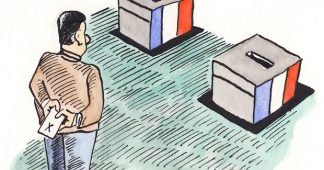By Roger Martelli
Macron managed to defeat the far right this time. But to get rid of the National Front for good, the Left will need to make a comeback.
1. For the third time since the election of the French president by universal suffrage, the Left was absent from the second round.
The novelty, this time, was that this ill fate struck both the governmental left and right. Most of the voters for the two blocs that had previously shared the National Assembly now found themselves faced with — at best — a default option.
The result is apparent from the numbers: at least 25% abstention and 8.8% blank votes. In total, one-third of the electorate said that they were being forced to take an impossible choice. This was a little less than 1969 (when the total abstentions and blank votes reached 35.6%). This time we can note the particular indication represented by the record level of blank votes, almost doubling the previous highest levels in 1995, 2012, 1969, and 2002. While abstention is both a social phenomenon (the marginalization of popular layers) and an index of political dissatisfaction, the blank vote is a conscious political act, proper to an often educated and politicized population. For some time, the idea that the blank vote should be fully counted as a separate choice has been gaining strength: the 2017 presidential contest incontestably reinforces this demand yet further.
2. The National Front’s score in the first round and the result of the second suggest that barriers preventing the far right from reaching power still do exist.
But once again we also observe that these barriers are less watertight than they were in the past. The fear of a National Front victory is now counter-balanced by the anger levelled against those whom the majoritarian electoral system sets in opposition to it in the second round. “Everything except the FN” no longer has the power it once did.
The result that the National Front achieved was certainly beneath its expectations, a score less high than the surveys had foretold at the beginning of the campaign, and less strong than the 2015 departmental and regional elections had suggested. But despite everything it has confirmed, troublingly, that it combines a real national influence with a solid territorial implantation, especially in the north, the east, and the southeast of France (see data below).
So there is no use in leveling accusations against those who thought they had nothing to choose between globalization and national exclusion. Rather, the blame is to be sought among those who have eroded the sense of conflict that historically separated the Left and the Right, and which revolved around the question of freedom and equality. So long as we prefer competitiveness, flexibility, budget balancing, the state of war, and the state of emergency, we end up feeding the idea that the Left and Right have joined together in accepting the norms of competition and governance.
The far right remains an absolute evil, today like yesterday. But it is no longer possible to go on managing France like before, and imperturbably so for five years, only ultimately to make a last-ditch call for everyone to rally against the far right.
This strategy is doomed to failure, even in the very short term. In fifteen years, Marine Le Pen has already doubled her father’s score. The policies that will tomorrow be driven forward by the new denizen of the Élysée [presidential palace] have every chance of increasing the anger and even feeding the resentment that encourages desperate acts. The second round in 2002 was a worrying sign: the 2017 one must be taken for an alarm bell.
The territories whose inhabitants quite rightly consider themselves doomed to certain marginality and decline, and the popular categories left in an increasingly fragile condition by the retreat of the welfare state, have ended up getting used to the idea that the National Front is their last resort. All too often, the majority of them get taken into this logic of withdrawal and bunkering down. That is what we must now attack, to eradicate the dead ends that over time create electoral situations that seem to many to offer only impossible choices.
We must put a definitive end to the era of the sorcerers’ apprentices who have fed this trajectory. The Mélenchon vote showed that there is but one way to stop the advance of the National Front: by opposing to it a left that is really on the left, a popular left anchored in its founding values and capable of modernizing them. Whatever the frustrating setup of the second round, Mélenchon’s result was the most striking event in this whole electoral sequence.
3. Emmanuel Macron unsurprisingly achieved a big advance over his second-round rival. But of the two candidates, he received the lesser share of votes inspired by political conviction.
The new president cannot, therefore, rely on majority support for the choices he has been outlining over the last few months. He benefited from the repudiation that the National Front still inspires; but that does not wish away the fact that at the first round, when we did make a choice of principle, he achieved less than 25% of votes.
In getting close to 44% of registered voters’ backing, certainly he is not the numerically weakest in the annals of the presidential contest (see table below). He is well above Georges Pompidou in 1969 or Jacques Chirac in 1995. But he is far from the 60% Chirac got in 2002. Indeed, if we take into account the share of François Fillon and Jean-Luc Mélenchon’s voters that transferred to him against Marine Le Pen (around half, in each case) he did not get much beyond the electoral feat he pulled off the first round. He may well, then, be the president with the most fragile basis for the so-called “honeymoon” that used to be promised to the newly elected.

4. We know that the election of a new president is only meaningful when it is backed up by legislative election results giving him the parliamentary base he needs to govern.
The majoritarian logic of France’s institutions would theoretically assure him an advantage in this sense. Thus far a president starting out has never lacked the necessary bloc for applying his program.
But we are no longer in the old context put together by General de Gaulle in which the institutional spirit went hand-in-hand with the state of politics’ own inner workings. For a long time, the majoritarian principle was based on a clear confrontation between left and right, with one political force able to play a dominant role in each camp. Yet this model is now doubly challenged, by (1) the vagaries of a division that has been worn thin by a succession of administrations on both sides, and (2) the party system’s own loss of legitimacy. The presidential contest that has just concluded has confirmed the crisis of political identifications and the splintering of the overall landscape into four more or less coherent major units, each of which is more or less equivalent in size.
Thus the near-automatic character of the link between presidential and legislative votes is no longer guaranteed as it was in the past. At first glance, the new president has no lack of cards in his hand for the electoral confrontation that is now about to begin. He secured more than 25% of votes [in the first round] in 190 constituencies of metropolitan France, and 20% in 412. Arithmetically speaking, the only one challenging him is Marine Le Pen, who also enjoys a longer-rooted implantation than his own. But arithmetic and politics do not always make a happy couple.
For the moment, the few available survey data allow us to predict a disparate spread of votes, comparable to what we saw in the first round of the presidential election. According to IPSOS, a majority of those surveyed did not want Macron to have an absolute majority of MPs in order to carry forth his policy. Meanwhile pollsters IFOP and Harris Interactive have tested the first voting intentions: 22-26% for En Marche! candidates, 20-22% for the governmental Right, 20-22% for the National Front, 8 or 9% for the PS, 3% for the EE-LV [ecologists]. France Insoumise is placed at 13-16% and the Communist Party at 2%.
More generally, if the legislative election — which has been attached to the tail of the presidential election, since the introduction of five-year term limits — naturally gives an advantage to the designated president, it also includes local dynamics that can blur the institutional logic. Macron thus has his own position at the head of the state; for its part, the governmental right can count on the density of its local networks.

5. As for the radical left, it has far from negligible possibilities, which the survey data only confirm.
In 2012 it struggled in the passage from the presidential to the legislative elections. Now it can benefit from the exceptional dynamic of the Mélenchon vote. In around forty constituencies it gathered more than 30% of votes cast, and more than 25% in sixty-six. An important part of this electorate is already stating its intention to continue with this vote in the legislative elections.
But one of the conditions for passing from one contest to the next is the total unity of the forces who backed the France Insoumise leader’s candidacy. The force he has built under this label has proven how effective it is. For this reason, it is well-qualified to act as a rallying point, without that meaning it needs to force the adherence of those who have not yet chosen to join the new movement.
In a study carried out by YouGov for the Huffington Post, more than two-thirds of those interviewed in late April (69%) consider the Left Front united, which is a clearly higher percentage than all the other party formations. The figure is highest among radical-left sympathizers (71%) and above all among the youngest, who were a core of Mélenchon’s 2017 dynamic (also 71%).
All these people must not be left disappointed. So reason must win out, in order to reach an agreement as soon as possible.
6. The atypical second round was decided in the first round, with a narrow range of votes.
The four leading candidates were at a basically equal level, which left all hypotheses for the second round on the table. But we cannot neglect the fundamental facts that condition how the real forces are divided up. We will note three of these here: the demobilization of the lower classes since the early 1980s, following a long phase of growth in civic participation; the crisis of a traditional right perturbed by the National Front’s dynamic strength; the fragility of a left disconcerted by more than three decades of Socialist Party hegemony — a party constantly on the road to the center, and thus depriving itself of the popular roots it used to have.
The radical left can address the next episode, the coming parliamentary contest, with clear-sighted confidence. It is starting from a result reminiscent of the Communist Party’s old scores, following in its own historical traces and partly restoring its own dynamism (though not everywhere). Yet, at the same time, it is going beyond these past traces, territorially, socially and symbolically. In this context, a well-run and clear legislative campaign without ambiguities and sectarianism has every chance of bearing fruit.
Yet these fruits will themselves only prove able to last in the context of a fundamental recomposition. In the early 1970s Mitterrand’s Socialist Party was able to embody the spirit of the Left that was indeed on the left, but renovated. We know what resulted from this handover from a Communist Party unable to refound itself to a Socialist Party too quick to confuse modernization for capitulation.
The Mélenchon vote shows that in France — as in Spain, Portugal, and perhaps Belgium — the necessary recomposition can ultimately base itself on a wave of radicalism, breaking with decades of the Socialist Party running out of breath. Even so, this replenished left must not forget that the lasting reconquest of the popular layers comes not from resentment but from hope. The National Front will oppose resentment to the socio-economic logic of Emmanuel Macron.
For its part, the Left that is on the left will work to connect the necessary combativity to the patient construction of a new future — for an equal society based on solidarity and citizen spirit. That will be the foundation of a real opposition to the unacceptable. With this, the fight will not be the battle between two Frances or an “us” against “them,” but the powerful movement of “all of us together” for a new order. And not only in France.
Originally published in Regards. Translated by David Broder.











